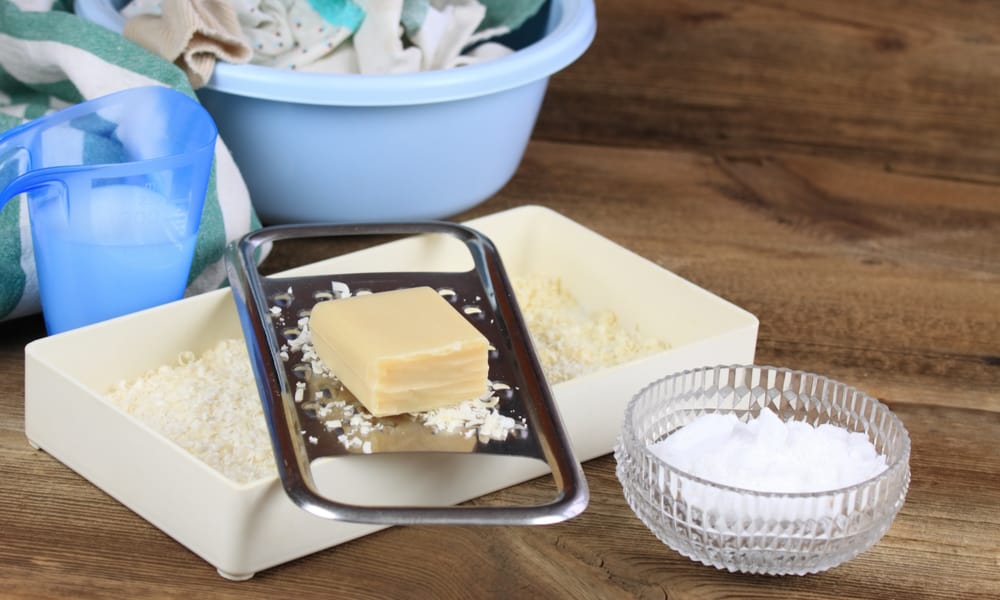Preparing your own natural homemade laundry soap is one of the best steps you can take if you are looking to switch to a cleaner and greener lifestyle. The real kicker is that you can save quite a bit of money.
Commercial detergents are effective but they can be quite harsh on clothes. On the contrary, the ingredients in natural laundry soap are mild, generally better for your health, and friendlier to the environment.
If you have the ingredients, you should be able to whip up good quality detergent in under an hour.
What You Need To Make Homemade Laundry Soap
The basic ingredients for homemade laundry soap are:
Pure Castile Soap
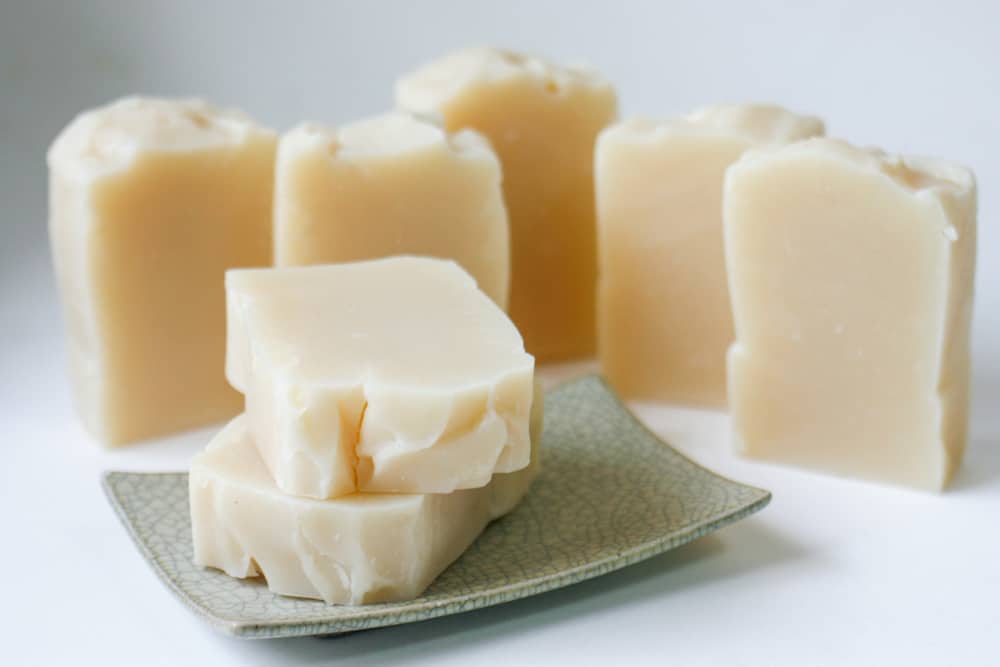
Castile soap is a type of soap made from plant oils such as hemp, avocado, coconut, castor, walnut, and almond oils. Not only is it environmentally friendly, but it is also a versatile cleanser to use around the house. Available in liquid and bar form, this soap is biodegradable, lathers easily, and has amazing cleaning and moisturizing properties.
Washing Soda
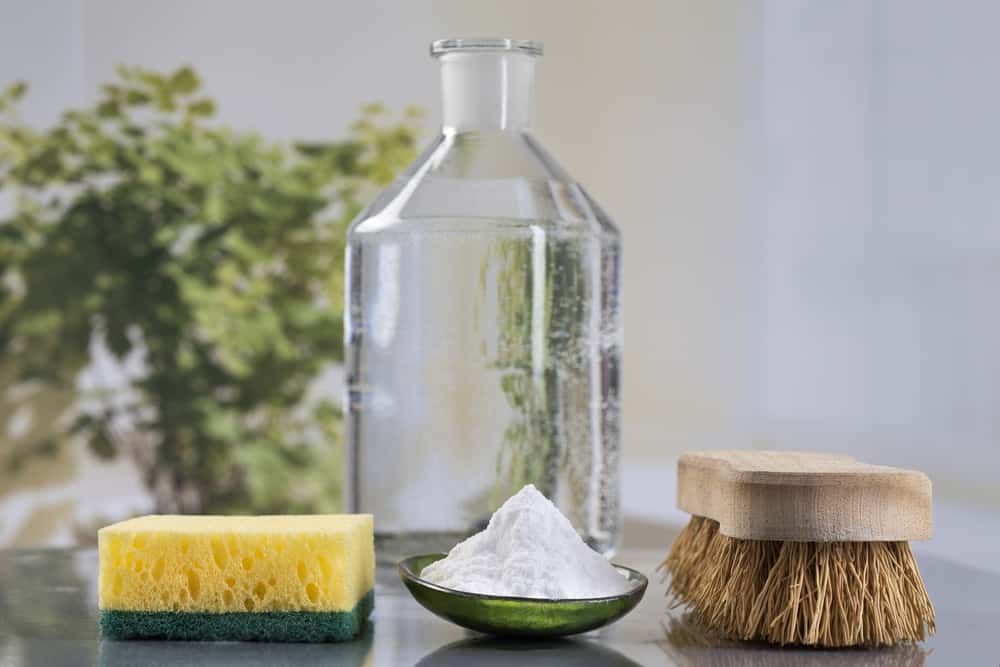
Washing soda goes by several names including sodium carbonate and soda ash. Washing soda should not be confused with baking soda even though both compounds are similar in many ways. Washing soda softens water, helping you to easily remove stains and dirt from the fabric. Always wear gloves when handling washing soda to avoid skin irritation. It is important to use durable nitrile gloves when handling washing soda to protect your skin from irritation and to ensure proper safety precautions are taken.
Baking Soda
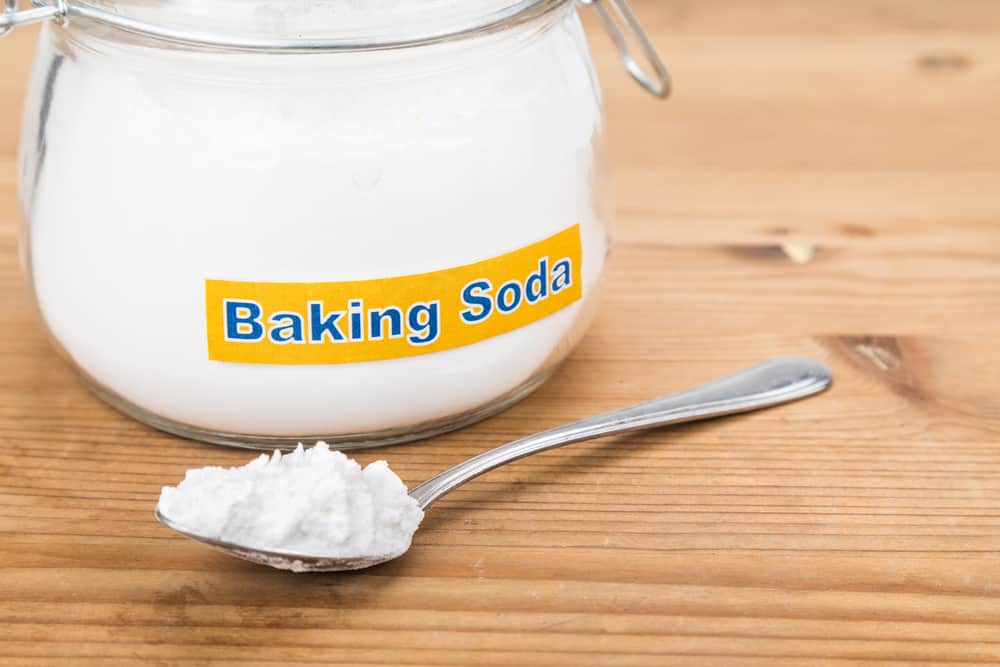
Baking soda is also known as sodium bicarbonate. Chemically, the difference between baking soda and washing soda is that baking soda contains water molecules and the latter does not.
Texturally, baking soda is a dusty, white powder while washing soda is made of granules that you can see and feel. Baking soda’s mild alkaline base makes it a great compound for cleaning delicate clothes.
Borax
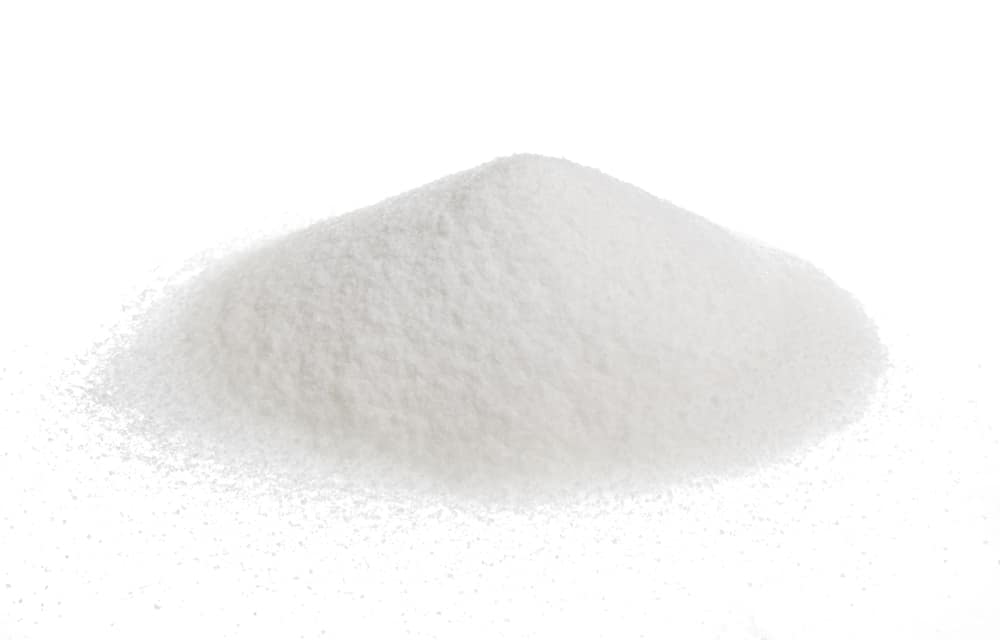
Some natural homemade laundry soap recipes call for the use of borax, a somewhat controversial ingredient. Borax is a naturally occurring salt and should not be confused with boric acid.
Boric acid is a dangerous chemical compound and is unsafe for use around the house. When used in laundry detergent, Borax helps to whiten whites, eliminate odors, soften water, and enhance the detergent’s cleaning ability.
Even though this is a natural ingredient, avoid getting undiluted Borax into contact with your mouth, eyes, or skin as it can cause irritation.
Depending on your needs, you can add other ingredients such as vinegar, sea salt, and essential oils for effective and fresh-smelling soap.
So, here are our best natural homemade laundry soap recipes.
1. Natural Homemade Laundry Soap With Sea Salt
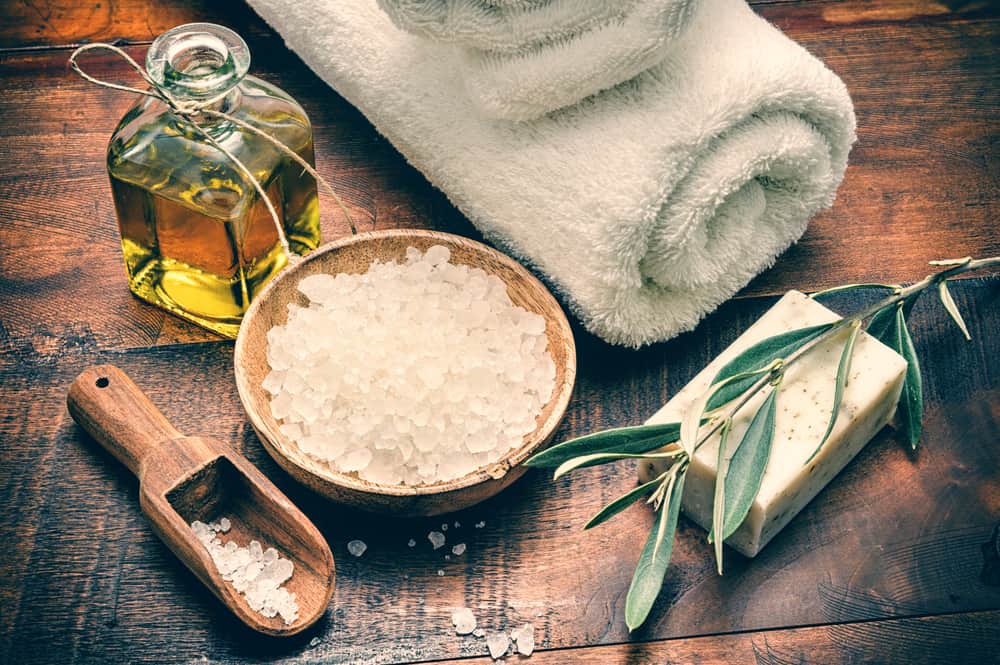
Sea salt is a cheap, non-toxic ingredient and is a great addition to your DIY laundry detergent. A small amount of salt helps to fight sweat odor, remove greasy stains, enables clothes to maintain their original color, and acts as a fabric softener too. We recommend using sea salt or kosher salt, and not Epsom salt, which contains magnesium and will harden water and make lathering difficult.
Ingredients
- 1 cup baking soda
- 2 cups sea salt
- 3 bars pure castile soap
- 3 cups borax
- 3 cups washing soda
- Optional: 50 drops essential oil
Method
If you are using solid castile soap, the first step is getting it into powder form by either grating with a cheese grater or grinding the bar soap in a blender.
Place the salt in a large dish and add 50 drops of essential oil of your choice. Mix thoroughly before adding the rest of the ingredients including the ground castile soap, washing soda, baking soda, and Borax.
Blend the mixture well before storing in an airtight container. It is best to complete this recipe in a well-ventilated room to avoid inhaling dusty soap particles.
2. Liquid Homemade Laundry Detergent
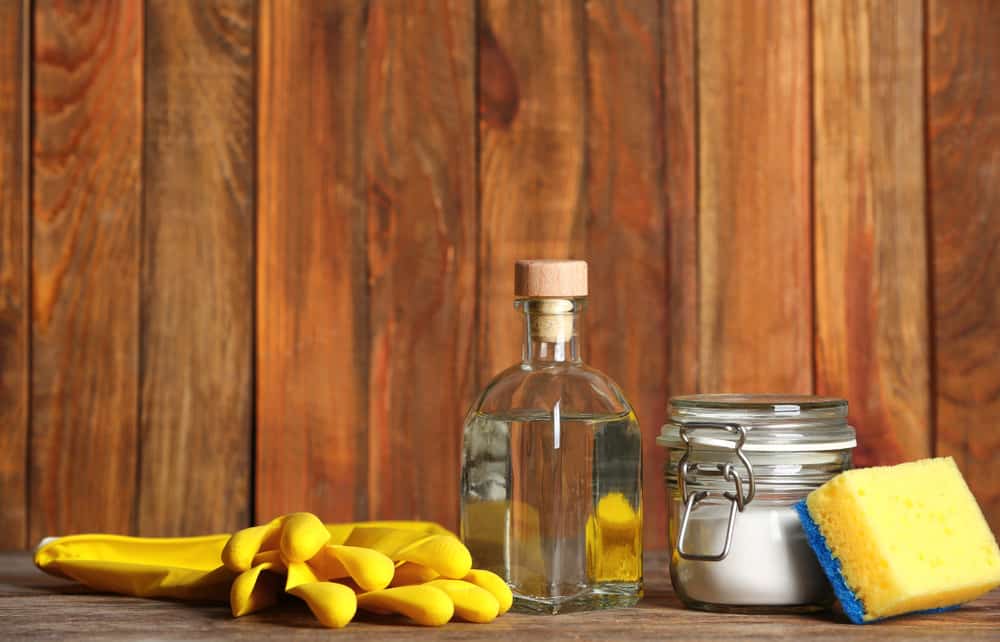
What is really great about liquid soap is that it does not leave pesky white flakes on clothes. This particular recipe uses liquid castile soap and a little bit of water.
Although this recipe does not contain baking soda, the washing soda and borax still do a great job of cleaning clothes and retaining fabric quality.
Ingredients
- 2 cups liquid castile soap
- 1 cup washing soda
- 1cup Borax
- 10 cups water
Method
Add 5 cups of water in a medium-sized pot and bring to boil. Remove the pan from the heat, add washing soda and borax into the hot water, and mix thoroughly.
In another bowl, add essential oils, castile soap, and the remaining water and whisk to combine. Mix the washing soda mixture with the castile soap mixture and you have your homemade liquid soap.
Store the soap in a lidded container. You will need about a ¼ cup of the soap for larger laundry loads and up to 1/8 for smaller ones.
3. Water-Based Homemade Laundry Soap
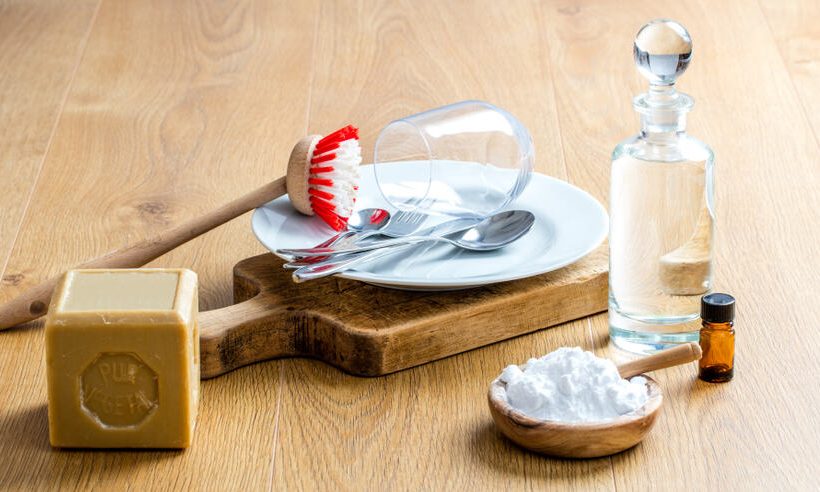
If you prefer liquid laundry soap but you do not have liquid castile soap, consider a water-based recipe instead. This one makes use of baking soda, grated or ground bar soap, and a good amount of water.
Ingredients
- 1 bar pure Castille soap
- 2 cups baking soda
- 2 gallons hot water
Method
For best results, grind the castile bar soap into fine crumbles and set aside. Bring the water to a boil before pouring into a large bucket.
Then, add the ground soap. Be sure to mix thoroughly. Finally, add the baking powder, stir for a few more minutes, and set aside to cool.
You will need at least ½ cup for each load of mildly dirty clothes or more for a very soiled load.
4. Natural Laundry Soap With Oxygen Bleach Powder
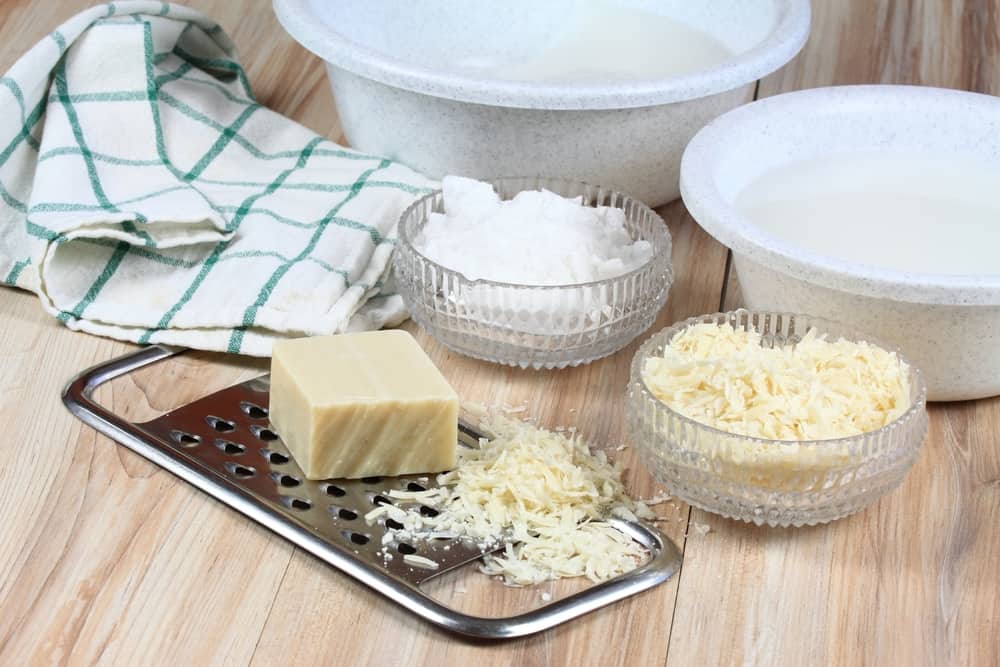
If you are looking for a natural homemade laundry soap that truly packs a punch in terms of fighting stubborn stains, adding oxygen bleach powder might do the trick.
Oxygen bleach, also known as sodium percarbonate, is a natural compound made from hydrogen peroxide and natural soda crystal. The oxygen bubbles in this substance help to weaken germs and dirt, and to remove odors. The best part is that oxygen bleach is non-toxic and environment-friendly.
Keep in mind that chlorine bleach, mainly made from sodium hypochlorite, is not the same as oxygen bleach. While chlorine is effective at whitening whites and disinfecting, this substance is more corrosive and is not as safe to use with colored fabrics as oxygen bleach is.
Also, mixing oxygen bleach with other detergents or ingredients is safe but this might not be the case with chlorine bleach.
Ingredients
- 2 bars pure castile soap
- 2 cups washing soda
- 1 cup oxygen bleach powder
- 2 cups borax
- Optional-45 drops essential oil
Method
Start by grinding the castile bar soap in a blender to get a powdery consistency. In another dish, mix all the other ingredients and then pour into the blender containing the ground castile soap.
Pulse for a few minutes to combine all the ingredients nicely before transferring to an airtight storage container.
5. Borax-Free Homemade Laundry Soap
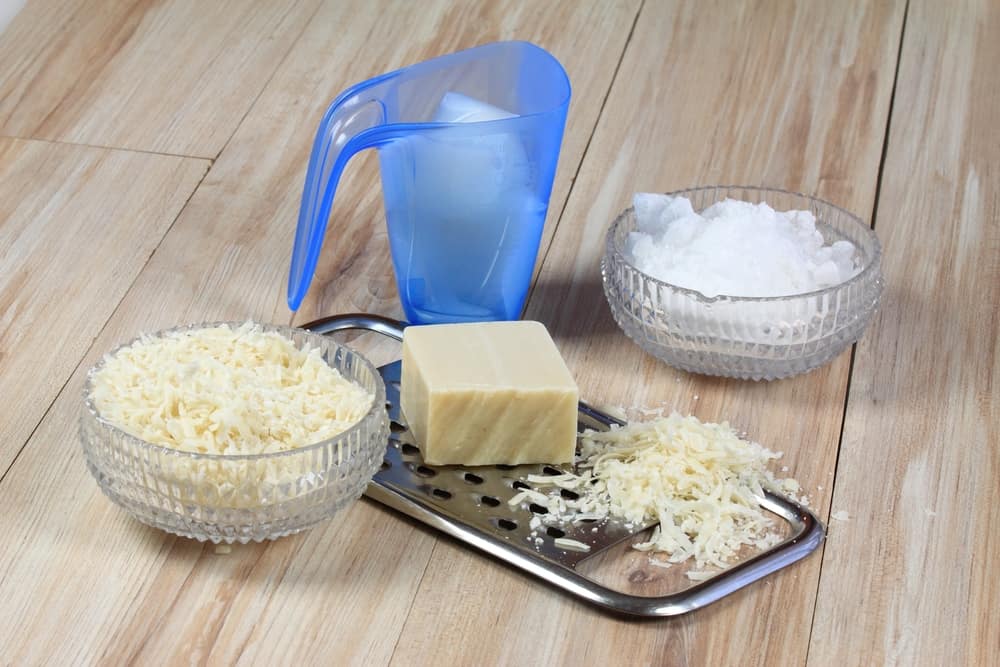
Not everyone is comfortable using Borax and the good news is you can skip the stuff and still come out with some pretty decent laundry soap.
Ingredients
- 1 cup washing soda
- 1 cup baking soda
- ¼ pure castile soap
- ¼ sea salt
Method
In a blender or food processor, grind chunks of the castile bar soap to achieve a powdery consistency. Add the remaining ingredients into the blender and pulse for 2-5 minutes with the blender lid on. Store in mason jars and use as needed.
6. Homemade Laundry Soap Softener With Vinegar
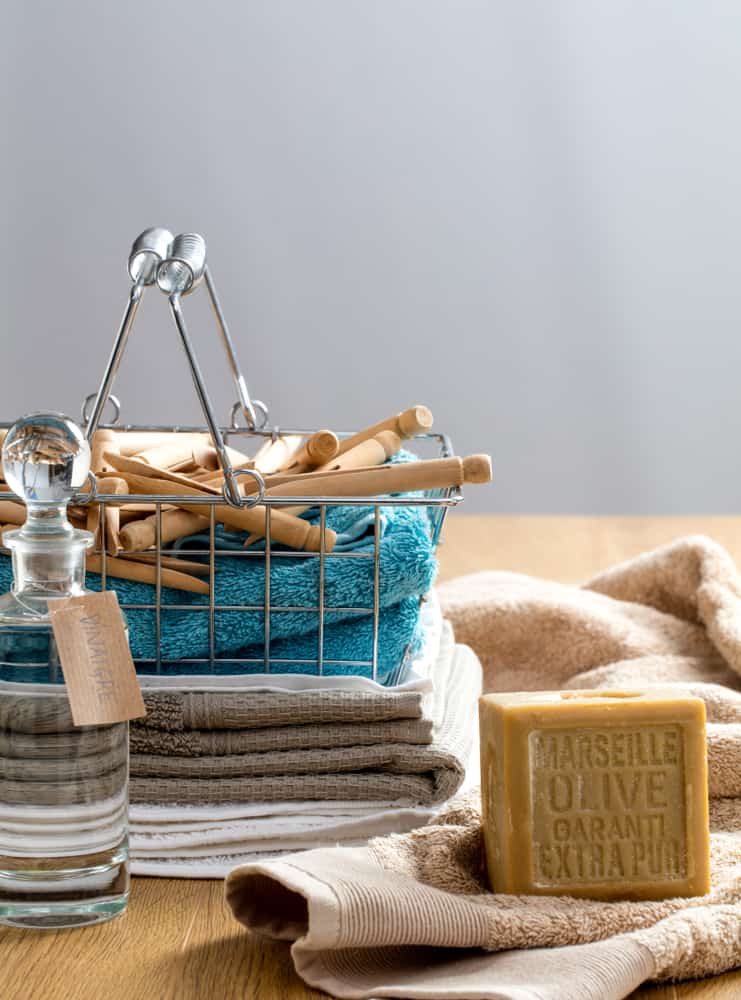
Everyone wants a detergent that not only cleans clothes and fights stubborn stains but also leaves the clothes soft and gentle to the skin. If you are looking for an alternative to the heavily scented store-bought fabric softeners, good old white vinegar might be a good option.
Other than the strong fragrance, commercial fabric softeners have been found to reduce the fire retardant properties of kid’s clothing. Vinegar might be a much safer alternative for cleaning your children’s clothes.
When buying vinegar for laundry, opt for white distilled vinegar. Although naturally extracted, this type of vinegar does not contain plant dyes that could potentially stain clothes. Also, it is less expensive compared to alternatives such as cider vinegar.
White distilled vinegar is not only inexpensive and environmentally friendly; it is also very effective in removing odor, brightening, and softening clothes. Acetic acid is what gives vinegar these powerful cleaning properties.
The acetic acid in distilled white vinegar is especially mild, making it friendlier to fabrics and colored clothes. Adding vinegar to homemade laundry soap can also help remove soap residue, leaving clothes looking bright.
Ingredients
- ½ cup distilled vinegar
- 2 ½ cups pure liquid castile soap
- 1 cup washing soda
- 1 cup baking soda
- 1 cup water
Method
In a plastic container, combine all ingredients and shake thoroughly to get everything nicely mixed.
7. Low Suds Homemade Laundry Soap
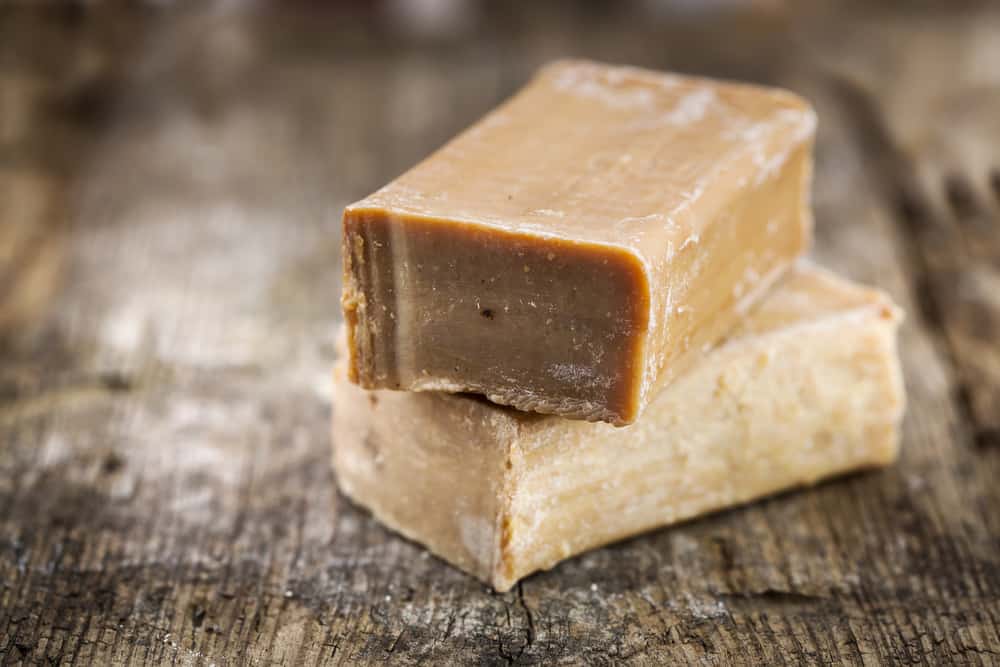
A question many people ask is “Is homemade laundry soap safe to use in high efficiency (HE) washers?’’ Well, the answer is it depends on how you make the soap.
Ideally, you should opt for a low suds soap if you have a HE washer. Basically, this type of soap does not lather too much.
Too many suds in the washer can actually be a problem. Washers work by getting clothes to rub against one another—this is how the clothes get clean.
Too many suds prevent clothes from rubbing against each other, and as you might have guessed, your clothes will come out less clean than you wanted.
HE washers automatically detect suds and water levels and may, in turn, prolong the rinse cycle if there is an excess of suds in the washer. As a result, you will end up using more water and electricity for each load. Additionally, too much sudsing can reduce your washer’s efficiency and, indeed, its life span.
To avoid excessive sudsing, you need to prepare a quality detergent and use the right amount for your laundry load size. One trick that might keep your homemade laundry soap as low suds as possible is adding a cleaning compound known as Sal Suds by Dr. Bronner’s.
Sal Suds is a natural, non-toxic and all-purpose liquid cleaner made from essential oils, natural fir, and surfactants derived from plants.
Note that this recipe calls for washing soda and not baking soda, which if used might cancel out the effectiveness of the Sal Suds. Castile soap is also optional here and can be substituted with the Sal Suds.
Ingredients
- 2 tablespoons washing soda
- 2 tablespoons Sal Suds
Method
Put the ingredient in a food processor and pulse for 1-3 minutes to get a thorough blend. Use 1 tablespoon for a regular load and 2 tablespoons for a larger or very soiled load.
8. Lemon Fresh Homemade Laundry Soap
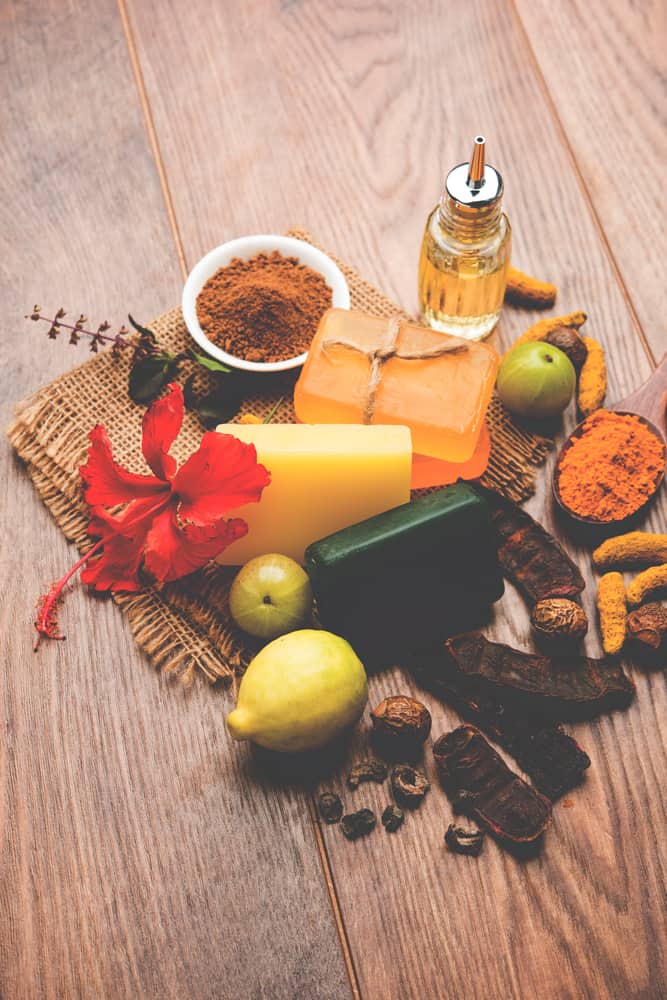
Adding citric acid to your laundry load can be a great way to revive dingy cotton linens and protect your treasured fabrics from the effects of harsh ingredients.
Citric acid is naturally found in citrus fruit but it can also be extracted from the fermentation of sugars using mold, also a natural process. Not only that but also this compound is biodegradable, making it safe for waterways.
Citric acid has powerful anti-bacterial, disinfectant, and cleaning properties. You can use it to remove rust, hard water stains, and soap residue. A little citric will go a long way in extending the shelf life of your homemade laundry soap.
In addition to citric acid, this recipe also uses aloe vera juice and grapefruit extract, both of which help to brighten and decontaminate clothes.
Ingredients
- 1 cup aloe vera juice
- 1 cup distilled white vinegar
- 2 cups pure liquid castile soap
- 2 tablespoons citric acid powder
- 2 tablespoons grapefruit seed oil
Method
Add all ingredients to a plastic container and shake gently for 1-2 minutes. Use ¼ cups for a regular load or more for a soiled load.
The Perfect Way To Clean Your Clothes
Regular store-bought laundry soap is chock full of harsh chemicals that can trigger allergic reactions such as sneezing and headaches. There is also the chance that a particularly strong detergent could make clothes dingy. Why would you opt for these when you can use your own natural homemade laundry soap that works equally well and saves you money?
